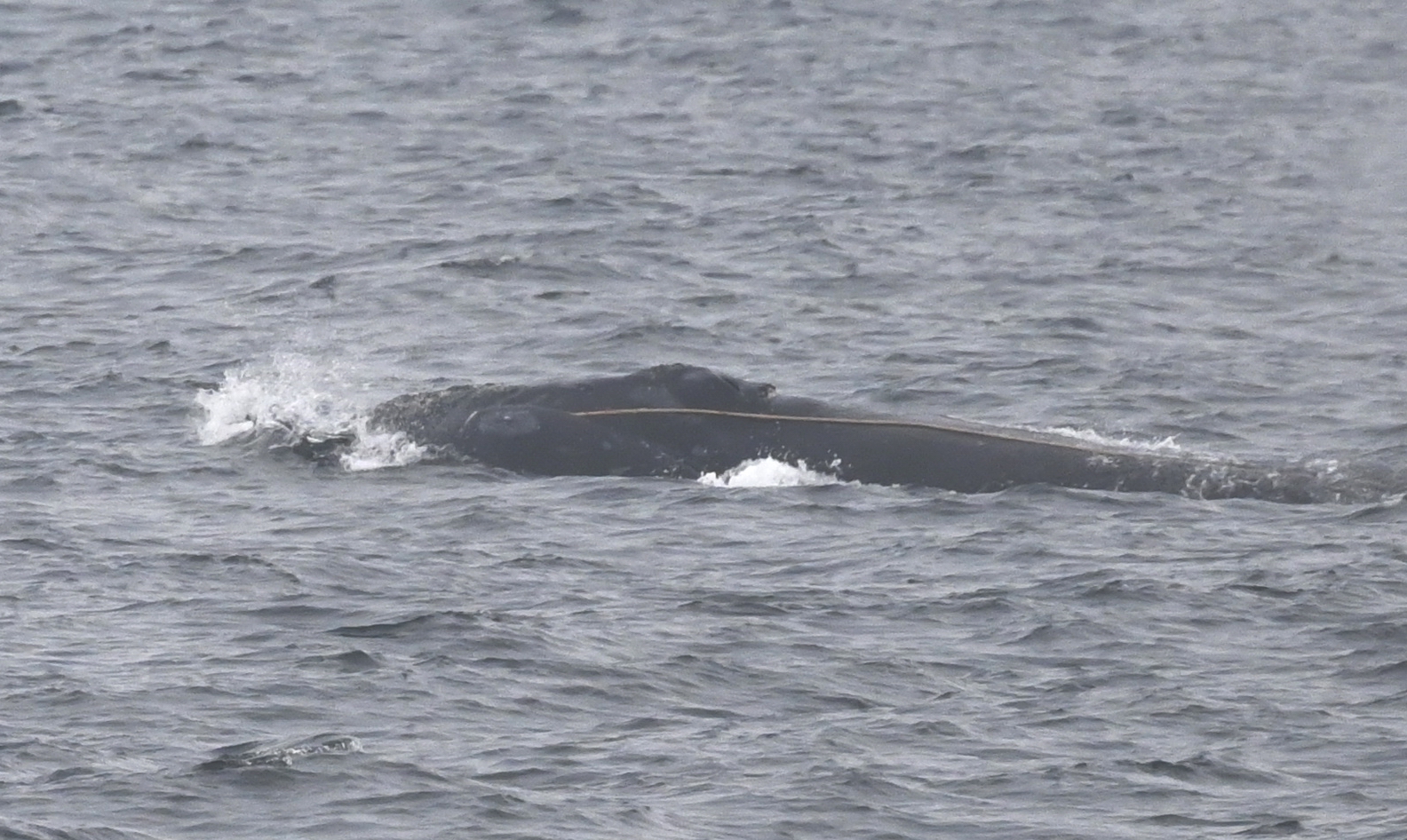
BOSTON, MASS. (July 26, 2023) – News of an entangled North Atlantic right whale in Canadian waters has scientists calling for stronger measures to protect the critically endangered species, which has an estimated population of less than 350 individuals.
A multi-organizational research effort led by Dalhousie University spotted the entangled whale on July 15 in the Gulf of St. Lawrence northwest of Prince Edward Island. The New England Aquarium confirmed the identity as unnamed whale Catalog #4042, the 13-year-old son of “Ravine” (Catalog #3142). He had rope through his mouth that trailed behind him and fresh wounds on his tail. The whale had been last seen just seven days earlier on July 8 in the Gulf of St. Lawrence, and he was not entangled at the time.
The Dalhousie team obtained photos by drone and boat to assess the extent of the whale’s entanglement. The group was able to track the whale for about 20 miles until losing daylight. The Campobello Whale Rescue Team was in the area the next afternoon once the weather improved, but #4042 was not sighted that day. The whale has not been seen since despite several aerial surveys in the area in addition to ongoing vessel surveys.
Right whales travel hundreds of miles while searching for their preferred prey, a tiny zooplankton called copepods, which they feed on in large volumes. Warming waters in the northern Atlantic Ocean have led to shifts in right whale habitat use, with the animals changing where they feed off the northeast U.S. and Canada. In recent years, the Gulf of St. Lawrence has become the species’ primary summer feeding grounds.
This entanglement is the fifth case of a right whale observed with attached fishing gear in 2023, with four of the five cases having been linked to Canadian gear. Entanglements continue to occur in both the United States and Canada with increasing prevalence.
“Right whales don’t recognize international borders. This crisis can only be solved if the United States and Canada work together and both take bolder action to implement stronger protection measures, including the broad adoption of ropeless fishing technology to help the fishing industry make a generational transformation to more sustainable practices,” said Amy Knowlton, Senior Scientist with the New England Aquarium’s Anderson Cabot Center for Ocean Life.
While advances in ropeless or “on-demand” fishing technology shows promise, widespread implementation requires significant financial support to escalate the manufacturing of the gear, address the gear conflict issue, and provide training and support for the fishing industry to adapt.
“Any delay in implementing broad scale gear modifications, especially in the offshore waters where right whales and more dangerous gear overlap, jeopardizes the future of this species. The more individuals we lose to entanglement injuries, the less likely the species can continue to remain viable,” said Aquarium Research Scientist Heather Pettis, who serves as executive administrator of both the Ropeless Consortium and the North Atlantic Right Whale Consortium.
The North Atlantic right whale’s critically endangered population has been in decline since 2011. In 2017, NOAA Fisheries declared an Unusual Mortality Event because of the increasing frequency of entanglements and vessel strikes facing this species. A recent update indicated 114 cases of mortality, serious injury, and morbidity, 75 of which were related to entanglement. Aquarium research assessing human related impacts to right whales over a 41-year period shows that more than 86 percent of right whales have been entangled at least once, some as many as nine times, and the injuries have become more severe as ropes have become stronger and fixed-gear fishing effort has increased and shifted offshore.
Catalog #4042 has been entangled at least four other times before this event. In looking at the effects of fishing gear entanglements on health and reproduction, Aquarium research has found that North Atlantic right whales with severe injuries are more likely to die than those with minor ones and that females who survive severe entanglements have reduced calving rates. Guided by the science illustrating these problems, ropeless technology is a path forward to prevent unnecessary deaths and severe injuries while keeping fishermen on the water.
This summer, New England Aquarium scientists are part of collaborative research efforts in the Gulf of St. Lawrence with the Canadian Whale Institute and Dalhousie University, identifying individual North Atlantic right whales and collecting biopsy and fecal samples to better understand right whale health. The Aquarium has one of the longest-running right whale research programs in the world, extensively studying the animals for more than 40 years. Scientists focus on solutions-based work, collaborating with fishermen on new techniques to reduce deadly entanglements in fishing gear, conducting spatial analyses to assess risk from vessels, facilitating communication across the maritime industry to reduce vessel strikes, and working with lawmakers locally, nationally, and internationally to develop science-based protections for the whales.
MEDIA CONTACT: Pam Bechtold Snyder, psnyder@neaq.org; 617-686-5068
